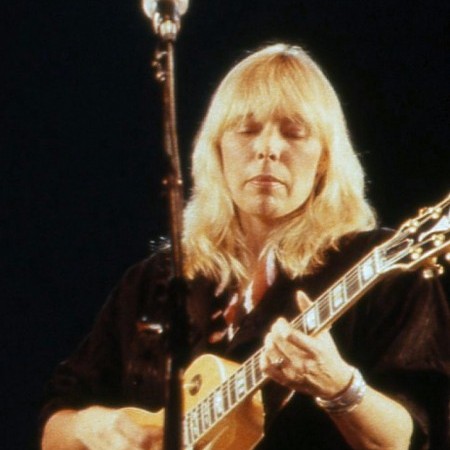
Joni Mitchell performs in 1983.
(Photo: Creative Commons Attribution 2.0 Generic)How sick was he then?
He was in a wheelchair. I never knew him when he was well, and I never heard him play; he was paralyzed then.
How much contact did you have, actually working together?
There were several visits to the house; the better part of an afternoon listening to old music, discussing the themes and his lyrical intent on the new melodies. Then he and Sue [Mingus] went to Mexico, to a faith healer down there. And during the time they were in Mexico, I went and spent 10 days with them. By that time, his speech had severely deteriorated. Every night, he would say to me, “I want to talk to you about the music,” and every day it would be too difficult.
So, some of what he had to tell me remained a mystery. But Sue gave me a lot of tapes of interviews with him, and they were thrilling to me, because so much of what he felt and described was so kindred to my own feelings; he articulated lessons that were laid on him by people like Fats Navarro and others. So, he was definitely a teacher of mine.
What in your work had attracted him to you and caused him to get in touch with you?
Somebody played him some of my records. Now, this is a story that came to me—there’s a piece of music of mine called “Paprika Plains,” which was done in sections. The middle of it is about seven minutes of improvisational playing, which I had somebody else orchestrate for me. And then stuck on to each end of it is a song that I wrote later around it. It was improvised off of a theme; then I abandoned the theme and just left the improvisational part, which I cut together. It’s a modern technological way of composing.
It was recorded in January, and the piano was tuned many, many times, so by August when I played the verses, which were born much later, the piano had slightly changed. So, when it was orchestrated, it’s in tune for a while, but then it hits that splice where it goes from the January piano to the August piano. With a fine ear, you can notice this. So, somebody was playing this piece for Charles, and Charles is a stickler for true pitch and time, and he kept saying, “It’s out of tune, it’s out of tune.” But when the piece was over he said that I had a lot of balls!
So, something about it—whatever it was he didn’t like, he also saw some strength and certainly an adventuresome spirit, because I’d been pushing the limits of what constitutes a song for years; I keep trying to expand it—with an instrumental in the middle or with no known or prescribed length, but just as long as my own interest will hold out. And I presume that if it will hold my interest that long that it will at least hold the interest of a minority [of listeners].
So, as near as I can tell, that was part of it, that he felt that I had a sense of adventure. DB